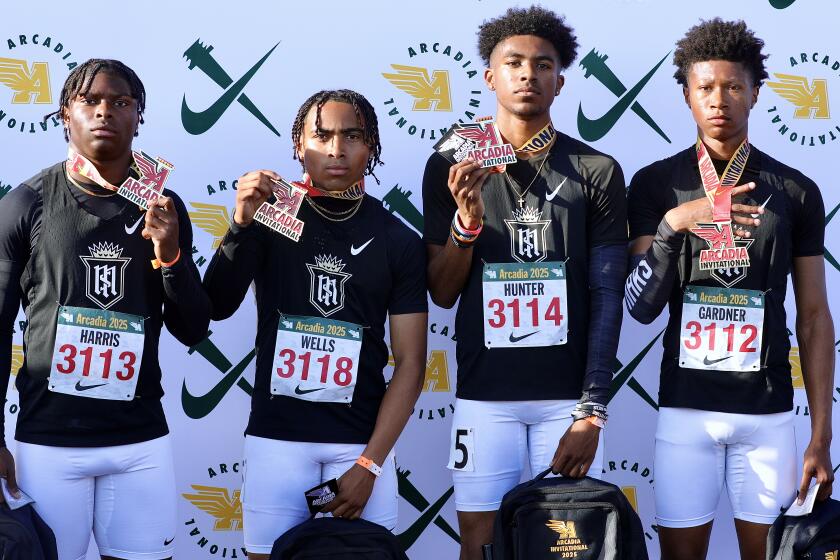City Section Leader Will Inherit Problems
- Share via
The Los Angeles Unified School District is looking for a new commissioner to oversee its senior high athletic department. Eight finalists will interview today.
The winner replaces Hal Harkness, who steps down Oct. 1 after seven years.
Competition among the finalists is expected to be tough, since most candidates are about the same age with similar educational backgrounds. But the interview process will be the easy part.
The new commissioner will find an office in disarray, the result of continued budget cuts, growing numbers of student-athletes and shrinking resources.
Since Harkness started in 1986, the district has trimmed the athletic budget more than 20%. Coaches and administrators have to fight for every dollar, often beseeching school board members at public meetings.
Most sports have only one paid coach, meaning that junior varsity and freshman programs are headed by volunteer assistants.
Many top coaches have retired or defected to other districts with more money and fewer problems.
Making matters worse, Harkness was left to run things by himself last fall when longtime assistants Pat Harvey and Lee Joseph were reassigned to save money.
All of this has occurred while many of the district’s 49 high schools have experienced significant growth, combining for a record 127,000 students. The diverse makeup of the district has also presented problems because many athletes do not speak English as a language of choice.
Harkness, 54, is years away from retirement age, but said he submitted his resignation in April because he was troubled by the way the district conducted business.
“When you’re no longer comfortable with the way decisions are made and your role, I feel it’s time to move on,” he said.
Although his hands were often tied because of district politics, Harkness himself has been part of the L.A. City Section’s image problem. One of 10 sections in the CIF, the City has taken a back seat in recent years to the bordering Southern Section, which has 10 times as many schools and is not tied to one district.
Barbara Fiege, athletic director at Belmont and a finalist for City commissioner, said the criticism is often unfounded.
“This section has very unique problems that make it unlike any other district in the country,” Fiege said. “It may be why there is so much second-guessing.”
But Fiege acknowledges that she would make changes if she were offered the job. She says she would make schools more accountable for their own programs and try to improve media relations.
Harkness, a former track and cross-country coach at UCLA, never seemed comfortable dealing with the media. He often declined to clarify himself or refused comment. Since he was the district’s spokesman, however, that was, or should have been, a major part of the job.
Playoff pairings were a continuing problem, usually unavailable until the last minute and subject to changes even after events had begun.
And then there was the growing problem of students transferring within the district solely for athletic purposes. Harkness cited policing this eligibility merry-go-round as perhaps his biggest challenge.
Even so, that might have been the area in which he was the least effective. City coaches are pointing fingers more than ever these days, many claiming that recruiting and transferring are beyond control.
Few athletes lost eligibility with Harkness as commissioner. Recently, The Times ran a story alleging that four players on the Crenshaw boys’ basketball team last season did not meet residence requirements.
The commissioner responded by announcing that he would investigate the situation. Last week, he said he had found no wrongdoing and cleared the school.
The investigation included only one visit to the school and no visits to the homes of the players in question. No one from The Times was interviewed.
Instead, Harkness allowed the school’s principal to do much of the investigating. The findings were discussed for three hours by the district’s athletic rules committee, but the meeting was closed to the public.
When the meeting ended at 5 p.m., Harkness said he would not discuss the matter until the following day.
“I don’t feel like dealing with this anymore,” he said.
Unfortunately, that was too common a response, a reflection of the apathy that went with the office.
The new commissioner, expected to be selected by July 15, will have a full agenda of problems to deal with, not the least of which is a badly tarnished image.
*
CIF officials were happy with the rescheduled finals of the State track and field meet Saturday at Cerritos College.
They said 88% of the qualifiers participated in the finals, which had been canceled June 5 because of heavy rain. Many events had full fields.
Thomas Byrnes, CIF commissioner, had estimated that the state office would lose $40,000 by canceling the finals. Although figures are not available, that loss should drop significantly, even though the CIF had to help pay for travel and lodging costs last weekend.
“Any money lost will come out of reserves,” spokesman Jim Duel said.
The average attendance for the State meet is about 15,000 for two days, but after the cancellation and sudden rescheduling this year, it was only 11,000. Saturday’s crowd of 5,300 for the finals was the smallest in years.
More to Read
Get our high school sports newsletter
Prep Rally is devoted to the SoCal high school sports experience, bringing you scores, stories and a behind-the-scenes look at what makes prep sports so popular.
You may occasionally receive promotional content from the Los Angeles Times.






